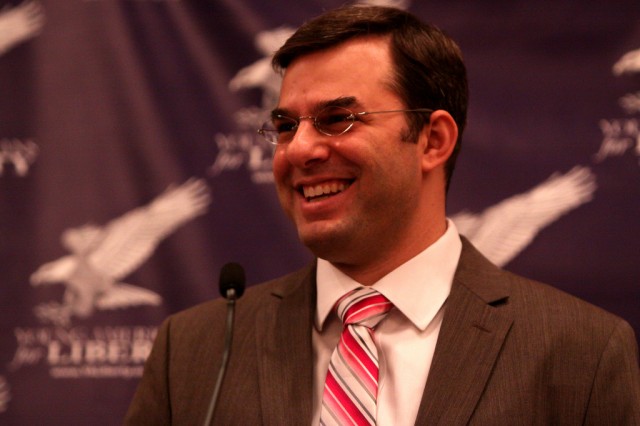
A critical vote for intelligence funding today showed that Congress is sharply divided on the issue of NSA domestic surveillance. This afternoon, the House of Representatives narrowly shot down an amendment that would have stopped the NSA from engaging in any warrantless collection of telephone data in a 205-217 vote.
The amendment was sponsored by Rep. Justin Amash (R-MI) and co-sponsored by John Conyers (D-MI). The summary of the amendment read:
Ends authority for the blanket collection of records under the Patriot Act. Bars the NSA and other agencies from using Section 215 of the Patriot Act to collect records, including telephone call records, that pertain to persons who are not subject to an investigation under Section 215.
Amash and Conyers sponsored a similar bill several weeks ago, but there's been little movement on it. Their strategy this week was to propose the change as an amendment to a $600 billion defense spending bill being considered this week. That strategy quickly pushed the surveillance issue to the House floor.
In a surprise vote on Monday, the amendment was ruled "in order" by the House Rules Committee, meaning it would have to face a vote. On Tuesday, activist groups began rallying for the cause and notifying the press at large about the vote.
The vote occurred just before 7pm Eastern time today, after about an hour of debate. The amendment's supporters came from liberals and conservatives alike, as did its opponents. Rep. Jim Sensenbrenner (R-WI), the author of the original Patriot Act, spoke in favor of the measure, saying that the NSA's collection of domestic phone data had gone far beyond what he envisioned.
Opponents came from all political stripes as well. Former House speaker Nancy Pelosi (D-CA), a voice from liberal San Francisco, voted against the amendment, as did Michele Bachmann (R-MN), a favorite of the conservative Tea Party. Current Speaker of the House John Boehner (R-OH) voted no. The House's final roll call shows supporters of the amendment included 94 Republicans and 111 Democrats.
Today's vigorous debate, and the clearly divided lower house, is a sharp contrast to initial Congressional discussions about the leaked intelligence information, in which there was little criticism of the NSA. It's also a rebuke to surveillance supporters like Sen. Diane Feinstein (D-CA) who have suggested that Congress knew about, and supported, the universal collection of Americans' phone records.
Even though the NSA program was not overturned, groups that oppose the programs celebrated today's close vote as representing big progress. If seven votes had gone the other way, the NSA would have had to stop.
"While ultimately not successful, this vote showed that more than 200 members of Congress—including the author of the Patriot Act—oppose these programs," said David Segal of Demand Progress in an e-mailed statement. "These programs barely survived after a full court lobbying campaign by the White House, the Intelligence community, and the NSA proper. Today's vote shows that the tide is turning."
"This is a great first step. It's the best vote we've ever had on the Patriot Act," an ACLU lobbyist told The Guardian. It was a "sea change" in how Congress views bulk surveillance, she said, and it will at least force more privacy protections into a forthcoming intelligence authorization bill.
reader comments
212